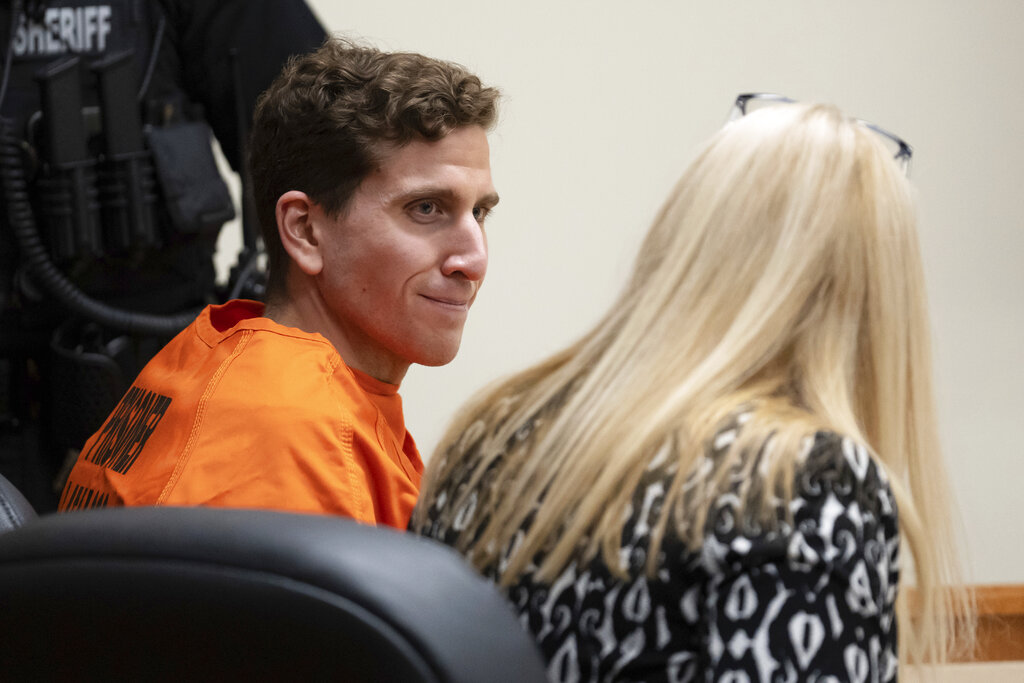Bryan Kohberger denied bail in first court appearance
(NewsNation) — Bryan Kohberger, the 28-year-old criminal justice graduate student accused of killing four University of Idaho students in November, was denied bail in his first court appearance Thursday.
This comes as a newly unsealed probable cause affidavit details how police identified Kohberger through a combination of DNA evidence at the scene, cell phone records and his white Hyundai Elantra.
Facing four counts of first-degree murder and felony burglary, Kohberger appeared before a Latah County judge in Idaho where he was read the charges against him during an arraignment hearing.
Kohberger was silent and emotionless during the hearing other than responding “yes” to the judge after each charge was read.
The victims’ families sat in the front row in court and quietly wiped away tears and cried when the charges were read.
“It’s obviously an emotional time for the family seeing the defendant for the first time,” said Shannon Gray, an attorney for the Goncalves family. “This is the beginning of the criminal justice system and the family will be here for the long haul.”
The judge then set a status hearing for Jan. 12 at 10 a.m.
The Latah County sheriff told NewsNation he has heard of nothing out of the ordinary regarding Kohberger’s time behind bars so far.
He said the jail is trying to accommodate Kohberger’s vegan diet restrictions, “but we are not going to buy new pots and pans or anything like that.”
The court records which became available Thursday morning revealed the justification authorities used to obtain a warrant for his arrest.
The 28-year-old doctoral student at Washington State University arrived in Moscow on Wednesday evening after flying under armed guard from Pennsylvania. He was then taken to the Latah County Jail in Moscow.
The public release of court documents shed some light on Latah County Prosecutor Bill Thompson’s reasons for accusing Kohberger in the Nov. 13 stabbing deaths of Kaylee Goncalves, Madison Mogen, Xana Kernodle and Ethan Chapin and answer key questions about how authorities built a case against him.
Kohberger was arrested at his parents’ home in eastern Pennsylvania last week and agreed to be extradited to Idaho. His attorney Jason LaBar said Kohberger was eager to be exonerated and described him as “an ordinary guy.” The attorney said that Kohberger would be represented by the chief public defender in Idaho’s Kootenai County upon his return to the state.
He appeared in court Tuesday where he waived extradition, telling the judge he is not on any medication that would impact his decision-making. Kohberger nodded to his family seated in the front row. His mother cried as his sister comforted her.
The Moscow Police Department also announced a Latah County judge issued a gag order in the case, barring law enforcement personnel and attorneys from talking about it.
Meanwhile, Kohberger apparently stayed in Pullman, Washington, through the end of the semester at WSU. He then drove across the country to his parent’s home in Pennsylvania, accompanied by his father. They were in a white Hyundai Elantra.
While driving through Indiana, Kohberger was pulled over twice on the same day — first by a Hancock County Sheriff’s deputy and a few minutes later by an Indiana state trooper.
Body camera video of the first stop released by the Hancock County Sheriff’s Office shows Kohberger behind the wheel and his father in the passenger seat on Dec. 15. Both men told the law enforcement officer that they were traveling from WSU before the officer sent them on their way with a warning for following too closely.
The Indiana State Police released bodycam footage of the second stop. The agency said that at the time, there was no information available to the trooper that would have identified Kohberger as a suspect in the killings. Kohberger was again given a warning for following too closely.
Tune into the NewsNation Special Report: Idaho Murder Mystery on Sunday at 9 PM EST/8 PM CST. Senior National correspondent Brian Entin will be LIVE in Moscow, Idaho sharing stories from a community on edge amid the desperate search for a killer.















